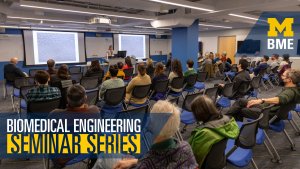Presented By: Biomedical Engineering
Dissecting a post-translational modification code in cardiac reprogramming
Biomedical Engineering (BME 500) Seminar Series - Zhong Wang

Abstract:
Cell fate conversion is associated with extensive epigenetic and post translational modifications (PTMs) and architectural changes of sub-organelles and organelles, yet how these events are interconnected remains unknown. We report here the identification of a phosphorylation code in 14-3-3 binding motifs (PC14-3-3) that greatly stimulates induced cardiomyocyte (iCM) formation from fibroblasts. PC14-3-3 was identified in pivotal functional proteins for iCM reprogramming, including transcription factors and epigenetic factors. Akt1 kinase and PP2A phosphatase were a key writer and eraser of the PC14-3-3 code, respectively. PC14-3-3 activation induces iCM formation with the presence of only Tbx5. In contrast, PC14-3-3 inhibition by mutagenesis or inhibitor-mediated code removal abolished reprogramming. We discovered that key PC14-3-3 embedded factors, such as Hdac4, Mef2c, Nrip1, and Foxo1, formed Hdac4 organized inhibitory nuclear condensates. Notably, PC14-3-3 activation disrupted Hdac4 condensates to promote cardiac gene expression. Our study suggests that sub-organelle dynamics regulated by a post-translational modification code could be a general mechanism for stimulating cell reprogramming and organ regeneration.
Bio:
Dr. Zhong Wang is an Associate Professor of Cardiac Surgery, at the University of Michigan Medical School. The long-term goal of the Wang laboratory is to develop heart therapies to effectively prolong and improve the life of patients with cardiovascular disease. The Wang laboratory has made significant progress in four research directions. One research direction is to define the epigenetic mechanism mediated by ATP-dependent chromatin remodeling in cardiac progenitor specification and differentiation. Direction two is to define essential cross-talks between energy metabolism and epigenetics in heart repair and regeneration. Direction three is to identify epigenetic and post-translational modification mechanism and related molecules in stimulating reprogramming of fibroblasts into cardiomyocytes for heart regeneration. And direction four is to explore novel strategies combining optimal cardiovascular cell types and bioengineering/biomaterials for heart cell therapy.
Cell fate conversion is associated with extensive epigenetic and post translational modifications (PTMs) and architectural changes of sub-organelles and organelles, yet how these events are interconnected remains unknown. We report here the identification of a phosphorylation code in 14-3-3 binding motifs (PC14-3-3) that greatly stimulates induced cardiomyocyte (iCM) formation from fibroblasts. PC14-3-3 was identified in pivotal functional proteins for iCM reprogramming, including transcription factors and epigenetic factors. Akt1 kinase and PP2A phosphatase were a key writer and eraser of the PC14-3-3 code, respectively. PC14-3-3 activation induces iCM formation with the presence of only Tbx5. In contrast, PC14-3-3 inhibition by mutagenesis or inhibitor-mediated code removal abolished reprogramming. We discovered that key PC14-3-3 embedded factors, such as Hdac4, Mef2c, Nrip1, and Foxo1, formed Hdac4 organized inhibitory nuclear condensates. Notably, PC14-3-3 activation disrupted Hdac4 condensates to promote cardiac gene expression. Our study suggests that sub-organelle dynamics regulated by a post-translational modification code could be a general mechanism for stimulating cell reprogramming and organ regeneration.
Bio:
Dr. Zhong Wang is an Associate Professor of Cardiac Surgery, at the University of Michigan Medical School. The long-term goal of the Wang laboratory is to develop heart therapies to effectively prolong and improve the life of patients with cardiovascular disease. The Wang laboratory has made significant progress in four research directions. One research direction is to define the epigenetic mechanism mediated by ATP-dependent chromatin remodeling in cardiac progenitor specification and differentiation. Direction two is to define essential cross-talks between energy metabolism and epigenetics in heart repair and regeneration. Direction three is to identify epigenetic and post-translational modification mechanism and related molecules in stimulating reprogramming of fibroblasts into cardiomyocytes for heart regeneration. And direction four is to explore novel strategies combining optimal cardiovascular cell types and bioengineering/biomaterials for heart cell therapy.